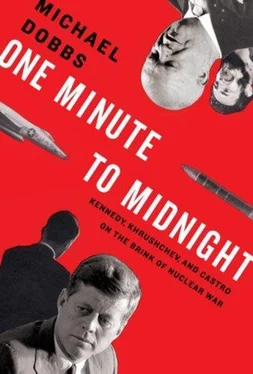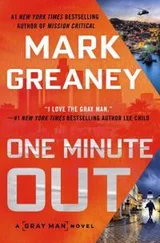“A U-2 has been lost off Alaska.”
It had taken SAC commanders an hour and a half to report the loss of the plane to civilian authorities, despite strong evidence that Maultsby had strayed over the Soviet Union. The initial reports were fragmentary. The Pentagon told the White House that the pilot “got off course” after developing “gyro trouble,” and was picked up by a “high frequency direction finder” off Wrangel Island. “Then seems to have overflown, or came close to, Soviet territory. Not clear at this time exactly what cause was. Russian fighters scrambled—ours too.”
The first reports were alarming enough. An American spy plane had probably overflown Soviet territory at a time when both countries were close to nuclear war. It had almost certainly run out of fuel. McNamara rushed out of the room to call the president. The logs of the meeting show that it was 1:41 p.m.
Worried about shutting down his engine, Maultsby had neglected to pull the cord that prevented his helmet from rising after his pressure suit inflated. The lower part of the helmet was now blocking his vision, and he had “a helluva time seeing the instrument panel” in front of him. He struggled with the helmet until he finally got it back in place.
Shortly afterward, the windshield fogged up and condensation appeared on the faceplate of his helmet. Maultsby pushed the faceplate as close to his mouth as he could. By sticking his tongue out, he was able to lick away enough of the condensation to see the instrument panel.
The altimeter continued to show a height of seventy thousand feet. Maultsby assumed that the needle had gotten stuck, but then he realized that the aircraft was still flying at that height, even without any power. It took at least ten minutes for the U-2 to start its slow descent. He told himself that all that remained for him to do was “keep the wings level, maintain a rate of descent for maximum range and hope my guardian angel wasn’t taking a nap.”
The throbbing noise of the engine had given way to an otherworldly silence. The only sound that Maultsby was able to hear was his own labored breathing. His most pressing physical need after nearly ten hours in the air was to urinate. Under normal conditions, relieving himself in a U-2 involved laboriously unzipping his partial-pressure suit, peeling away several layers of undergarments, and aiming into a bottle. A maneuver that was complicated enough at the best of times became virtually impossible when the pressure suit was inflated, almost filling the cockpit.
1:45 P.M. SATURDAY, OCTOBER 27 (9:45 A.M. ALASKA)
It had been a hectic morning, but the president was determined not to miss his regular swim. He usually went twice a day, just before lunch and again before dinner, with his aide, Dave Powers. His doctors had prescribed swimming exercises for his back, but it was also a way of relaxing. Originally built for Franklin Roosevelt as part of his treatment for polio, the indoor pool in the West Wing basement had been refurbished with a mural of a glorious sailing scene in the Virgin Islands donated by Joe Kennedy, Sr. The two friends engaged in light banter as they swam breast-stroke up and down the fifty-foot pool, which was kept at a constant ninety degrees.
Returning from his swim, Kennedy passed by the Oval Office before heading up to the mansion for a light lunch. The phone rang at 1:45 p.m. It was McNamara, with news of the U-2 missing off Alaska.
A few minutes later, the chief of intelligence from the State Department came running up the stairs from Bundy’s basement office. Roger Hilsman had just heard about the scrambling of Soviet and American fighter jets. Having gone two days without sleep, he was exhausted, but instantly understood the significance of what had happened. “The implications were as obvious as they were horrendous: the Soviets might well regard this U-2 flight as a last-minute intelligence reconnaissance in preparation for nuclear war.”
Hilsman was expecting a furious outburst from the president, or at least some sign of the panic he himself was beginning to feel. But Kennedy broke the tension with a short, bitter laugh and a truism from his Navy days.
“There’s always some sonofabitch who doesn’t get the word.”
The calm exterior belied a deep frustration. Unlike other members of his family, particularly his brother Bobby, Kennedy turned quiet when he was angry. His closest aides feared his gritted teeth more than his occasional explosions. When he was truly beside himself, he would tap his front teeth with his fingernails or grip the arms of his chair so hard that his knuckles turned white.
He was discovering the limits of presidential power. It was impossible for a commander in chief to know everything that was being done in his name. There were so many things he would never find out until “some sonofabitch” fouled everything up. The military machine operated according to its own internal logic and momentum. The Pentagon assured him that the air-sampling flights to the North Pole had been planned and approved many months in advance. Nobody had considered the possibility that a U-2 might end up over the Soviet Union on the most dangerous day of the Cold War.
It was not just the extent of his own ignorance that disturbed Kennedy. Sometimes, he would ask for something to be done and nothing would happen. An example of this phenomenon, at least in his own mind, was the Jupiter missiles in Turkey. He had wanted to get them out of there for months, but the bureaucracy had always found a compelling reason to override his wishes. He had voiced his exasperation during a walk in the Rose Garden with Kenny O’Donnell earlier that morning. He told his aide to find out “the last time I asked to have those damned missiles taken out of Turkey. Not the first five times I asked for their removal, just the date of the last time.” It turned out that the president had instructed the Pentagon to look into the removal of the Jupiters in August, but the idea had been shelved for fear of upsetting the Turks. Bundy later insisted that he never received a formal “presidential order” to remove the missiles, and the archival record appears to confirm his recollection.
Removing the Jupiter missiles had become even more complicated now that Khrushchev was attempting to use them as a public bargaining chip. But Kennedy was sure of one thing: he was not going to go to war over a few obsolete missiles. As a young naval officer in the Pacific, he had concluded that “the people deciding the whys and wherefores” had better have a convincing motivation for going to war because otherwise “the whole thing will turn to ashes.” That pretty much summed up the way he felt twenty years later, now that he himself was determining the whys and wherefores.
But the drama that Saturday afternoon had little to do with the wishes of either Kennedy or Khrushchev. Events were moving faster than the political leaders could control.
An American spy plane had been shot down over Cuba. Another had gone astray over Russia. A Soviet cruise missile battery had taken up position outside Guantanamo, ready to carry out Khrushchev’s threat to “wipe out” the naval base. A convoy of nuclear warheads was on its way to one of the R-12 missile sites. Castro had ordered his army to open fire on low-flying American planes and was urging the Soviets to consider a nuclear first strike.
The president did not even exercise complete control over his own forces. He had only a vague sense of a gathering confrontation in the Caribbean where American warships were attempting to force Soviet submarines to the surface and exhausted Soviet submariners were wondering if World War III had broken out.
The paradox of the nuclear age was that American power was greater than ever before—but it could all be jeopardized by a single, fatal miscalculation. Mistakes were an inevitable consequence of warfare, but in previous wars they had been easier to rectify. The stakes were much higher now, and the margin for error much narrower. “The possibility of the destruction of mankind” was constantly on Kennedy’s mind, according to Bobby. He knew that war is “rarely intentional.” What troubled him most was the thought that “if we erred, we erred not only for ourselves, our futures, our hopes, and our country,” but for young people all over the world “who had no role, who had no say, who knew nothing even of the confrontation, but whose lives would be snuffed out like everyone else’s.”
Читать дальше












